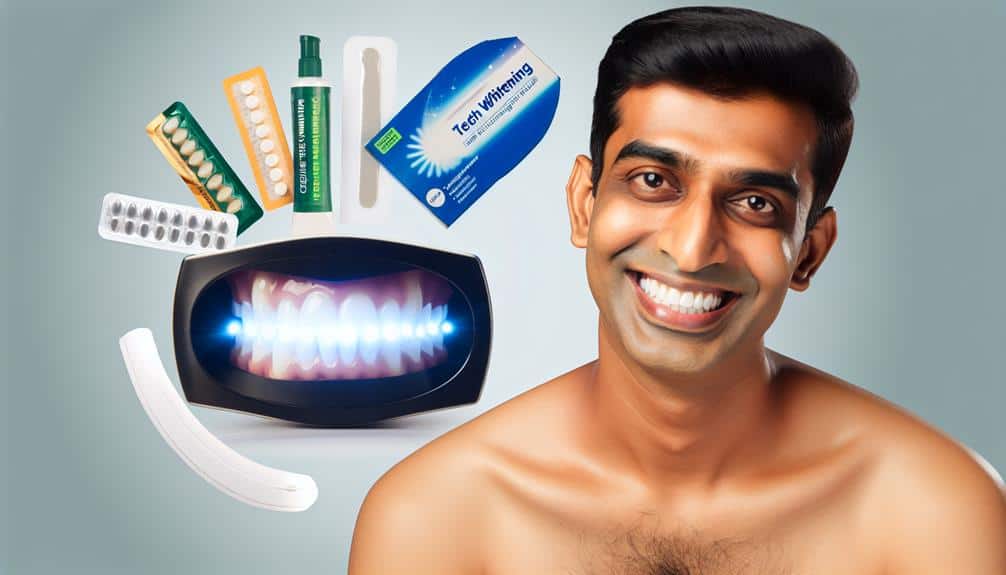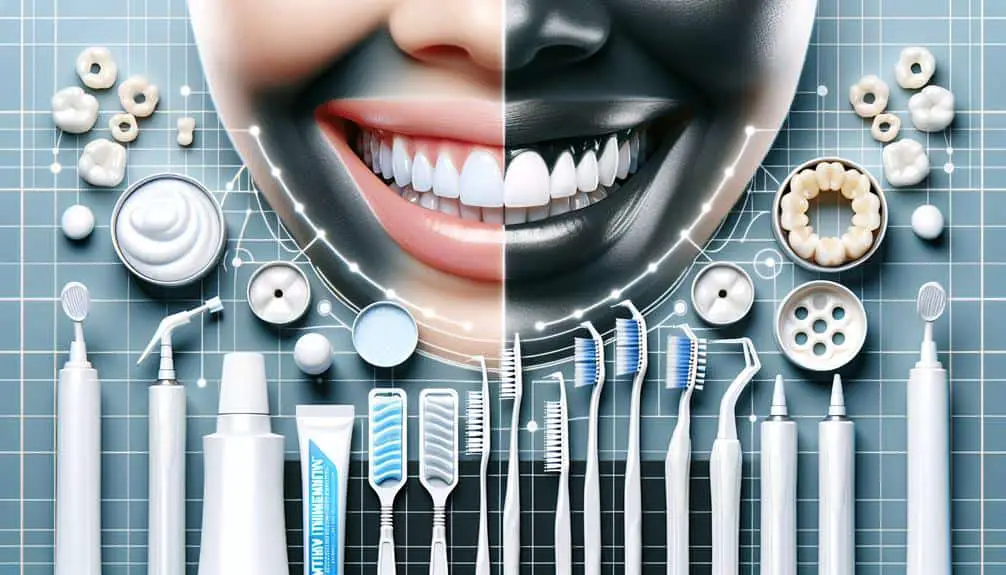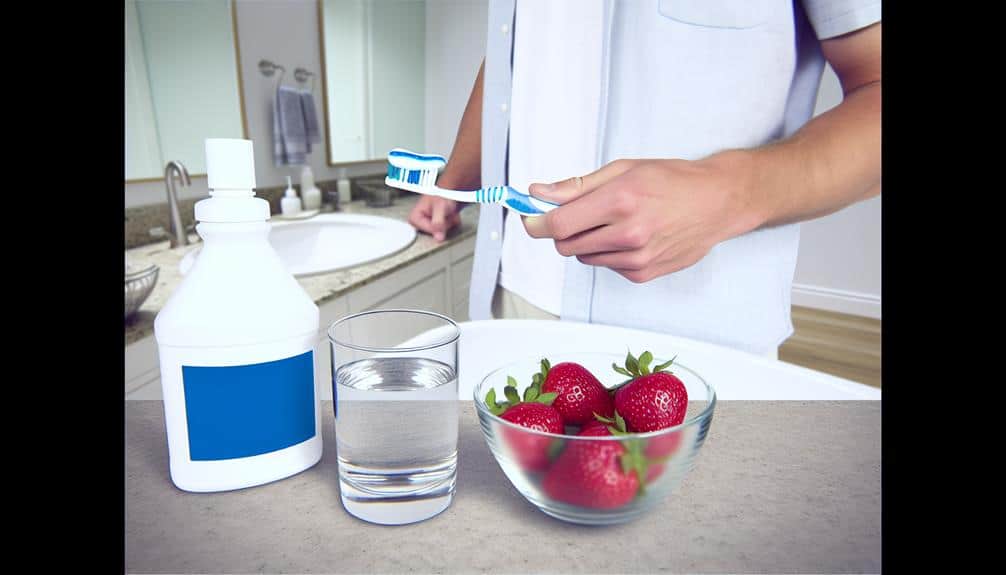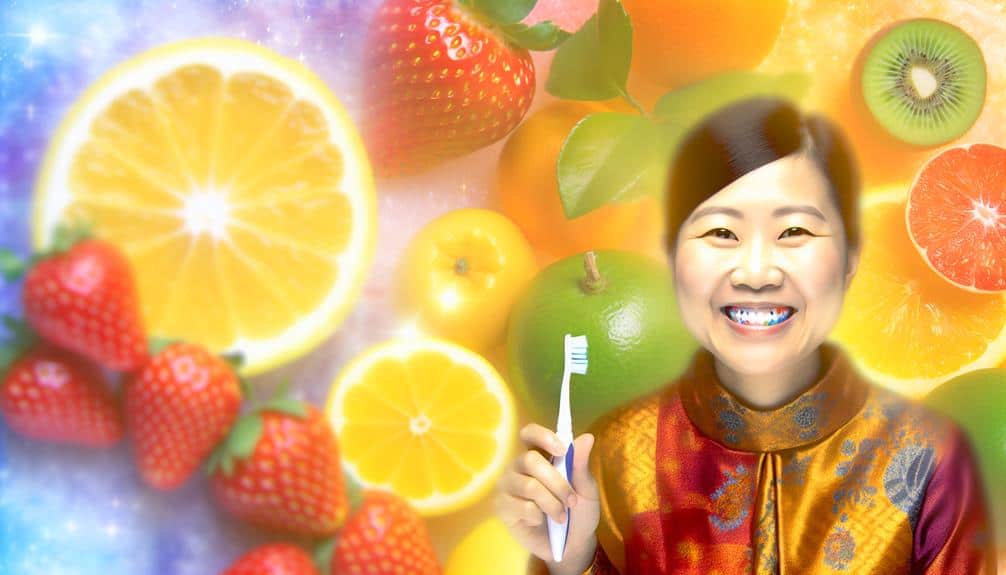To achieve a brighter smile and tackle stubborn discoloration, start by understanding the causes and factors contributing to tooth discoloration. Lifestyle habits can impact tooth color, so make sure you maintain good oral hygiene by brushing and flossing daily. Dark spots can be stubborn, often influenced by dietary habits, genetics, and enamel wear; consider changes in diet and seek professional dental care for effective solutions. Professional whitening treatments offer advanced options like laser whitening customized to your needs, with various whitening agent strengths available. At-home remedies such as oil pulling, baking soda paste, and hydrogen peroxide can also help brighten your teeth naturally.
To maintain your whitened smile, stick to consistent oral hygiene habits, avoid foods and drinks that stain, and consider using whitening toothpaste and mouthwash. Enhance your smile with these tips to combat discoloration effectively and ensure long-lasting results.
Key Points
- Consider professional whitening treatments for effective results tailored to your needs.
- Try at-home remedies like oil pulling or baking soda paste to lift surface stains.
- Maintain whitened smiles with consistent oral hygiene and limited consumption of staining foods.
- Regular dental visits for cleanings and touch-ups are essential for long-term results.
- Use whitening toothpaste and mouthwash to aid in the maintenance of a brighter smile.
Understanding Tooth Discoloration
To understand tooth discoloration, it's important to grasp the underlying causes and contributing factors that may affect the color of your teeth. Preventive measures play a vital role in maintaining a bright smile. Your lifestyle habits, such as consuming staining foods and drinks like coffee, tea, and red wine, can lead to discoloration over time. Additionally, poor oral hygiene practices, like irregular brushing and flossing, can contribute to the buildup of plaque and tartar, which can make your teeth appear dull and discolored.
Implementing preventive measures is key to combating tooth discoloration. Regular dental check-ups and cleanings can help remove surface stains before they become more pronounced. Brushing your teeth at least twice a day with a fluoride toothpaste and flossing daily can prevent plaque buildup and maintain the natural whiteness of your teeth. Additionally, avoiding tobacco products and limiting your intake of sugary and acidic foods can also aid in preserving your smile's brightness.
Causes of Stubborn Dark Spots
Dark spots on teeth can be stubbornly persistent and are often caused by various factors that require specific attention for effective treatment. Dietary habits play a significant role in tooth discoloration, with foods and drinks like coffee, tea, red wine, and dark berries staining the enamel over time. Genetics can also influence the natural color of your teeth, making some individuals more prone to dark spots than others.
Additionally, as we age, the enamel on our teeth wears down, exposing the darker dentin underneath, leading to discoloration. Smoking is another major culprit for stubborn dark spots, as the chemicals in cigarettes can cause yellowing and staining of the teeth.
To address these causes of stubborn dark spots, it's essential to make changes to your dietary habits by reducing consumption of staining foods and drinks. Understanding your genetic predispositions can also help tailor your oral care routine. Avoiding smoking and seeking professional dental care can further assist in managing and treating persistent tooth discoloration caused by these factors.
Professional Whitening Treatments
Consider professional whitening treatments as a reliable solution for addressing stubborn tooth discoloration caused by various factors. These treatments offer advanced technology and customized options to cater to your specific needs:
- Advanced Technology: Professional whitening treatments often utilize cutting-edge technology such as laser whitening or light-activated whitening systems. These technologies can help break down stubborn stains and reveal a brighter smile.
- Customized Options: Dentists can tailor the whitening treatment to suit your individual needs. Whether you have sensitive teeth or severe discoloration, there are various options available, including different strengths of whitening agents and treatment durations.
- Professional Expertise: When opting for professional whitening treatments, you benefit from the expertise of dental professionals who can ensure the procedure is done safely and effectively. They can also provide guidance on maintaining your newly whitened smile for the long term.
At-Home Remedies for Brighter Teeth
Enhance your smile's brightness with effective at-home remedies for teeth whitening. Natural remedies and DIY options can be gentle yet powerful solutions for stubborn discoloration. One popular method is oil pulling, where swishing coconut oil in your mouth for about 15-20 minutes can help lift surface stains.
Baking soda mixed with a small amount of water to form a paste is another well-known remedy due to its mild abrasive properties that can gently scrub away stains. Additionally, hydrogen peroxide diluted with water can be used as a mouthwash to help whiten teeth over time.
Turmeric, despite its vibrant color, can surprisingly aid in whitening teeth. By creating a paste with turmeric powder and water, you can brush your teeth with it to help reduce yellowing. Finally, strawberries contain malic acid, which can naturally whiten teeth. Mashing strawberries and baking soda together to form a paste and applying it to your teeth for a few minutes before rinsing can be a beneficial DIY whitening option.
Remember to use these remedies cautiously and not excessively to avoid damaging your enamel.
Maintaining Whitened Smiles
To maintain your newly whitened smile, it's important to establish consistent oral care habits that support the longevity of your teeth's brightness. Here are three key strategies to help you maintain your bright smile:
- Oral Hygiene:
Brush your teeth at least twice a day with a whitening toothpaste to remove surface stains and prevent new discoloration. Floss daily to clean between teeth and remove plaque buildup that can dull your smile. Consider using a whitening mouthwash to help maintain the whiteness of your teeth.
- Dietary Habits:
Limit foods and drinks that are known to stain teeth, such as coffee, tea, red wine, and dark berries. When consuming these items, use a straw to minimize contact with your teeth. Increase your intake of crunchy fruits and vegetables like apples and carrots, which can help naturally clean and whiten teeth.
- Regular Dental Visits:
Schedule regular dental cleanings to remove stubborn plaque and tartar that can cause discoloration. Your dentist can also provide professional whitening treatments to touch up your smile and keep it looking bright and healthy.
Frequently Asked Questions
Can Tooth Discoloration Be a Sign of a More Serious Dental Health Issue?
Tooth discoloration can indicate underlying dental health issues. Various root causes, like decay, trauma, or medication, may lead to discoloration. Regular dental check-ups can help identify and address these issues early, ensuring ideal oral health.
Are There Any Natural Remedies That Can Help With Stubborn Tooth Discoloration?
To tackle stubborn tooth discoloration naturally, consider using baking soda or activated charcoal. These remedies can be effective, but remember, dental health is important. If discoloration persists, consult a professional to rule out underlying issues.
How Long Do the Effects of Professional Whitening Treatments Typically Last?
Professional whitening treatments typically last from six months to two years, depending on aftercare and maintenance routines. Compared to at-home options, professional treatments offer longer longevity expectations with proper care, such as avoiding staining foods and drinks.
Is It Safe to Use At-Home Whitening Kits for Teeth With Stubborn Dark Spots?
Using at-home whitening kits on teeth with stubborn dark spots can be safe if used correctly. Pay attention to safety concerns and instructions. While cost-effective, professional treatments may offer longer-lasting and more effective results for stubborn discoloration.
What Foods and Drinks Should Be Avoided to Maintain a Bright White Smile?
To maintain a bright white smile, avoid stain-causing foods and beverages like coffee, tea, red wine, and berries. Opt for teeth whitening toothpaste and home remedies like baking soda or hydrogen peroxide to combat discoloration effectively.



